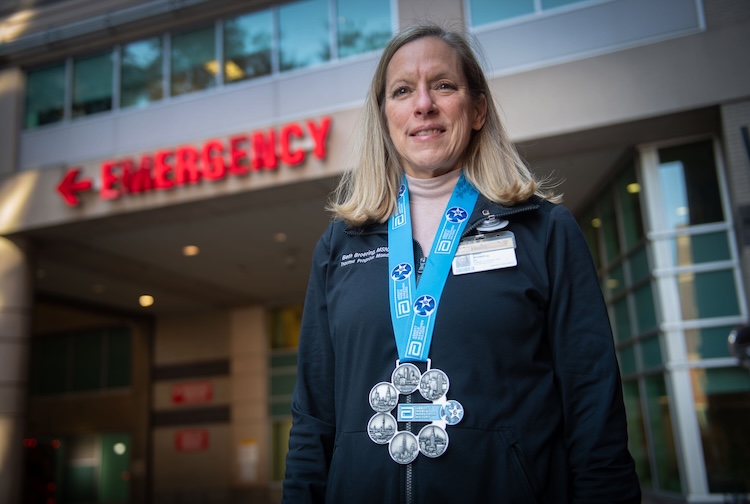Empowered choices: Expert insights on fertility options
Offering hope to families who want to grow, a VCU Health reproductive endocrinologist explains common causes for fertility issues and when to seek medical advice
August 12, 2025 According to the Centers for Disease Control and Prevention, one in five women have trouble getting pregnant or staying pregnant. (Getty Images)
According to the Centers for Disease Control and Prevention, one in five women have trouble getting pregnant or staying pregnant. (Getty Images)
By Sara McCloskey-Nieves
The path to parenthood isn’t predictable. With one in five women struggling to get pregnant, infertility touches the lives of millions of families in the United States.
It can be overwhelming to try to find someone to talk about infertility issues, but with new advances in research and treatments – there is hope for families who want to grow.
"If you are out there struggling with infertility, you're not alone,” said VCU Health’s Erika New, M.D., who is board-certified in both OB-GYN and reproductive endocrinology and infertility. “[Infertility] is not something people talk about often because, I think, a lot of people are afraid to talk about it or just don't know who to come to seek help for.”
In a recent episode of Healthy with VCU Health podcast, “Empowered Choices: Fertility Options for Everyone,” New discussed common fertility issues men and women experience and what kind of treatment options are available.
What advice do you give to people trying to get pregnant? Are there lifestyle factors, such as diet and exercise, that affect fertility?
One of the most important things to pay attention to is your menstrual cycle. Having a regular menstrual cycle where you can predict when your period is - that's a really good sign of healthy ovulation. It just gives you an idea of your general reproductive health and cycle.
In general, the things you would do just to stay healthy can also help your reproductive health. There’s not a specific diet we recommend, but in general, trying to eat a balanced diet and low inflammatory foods. We usually want more protein, less carbohydrates. Obviously, if you're trying to get pregnant, we ask our patients to restrict smoking and restrict alcohol use.
What are common factors that can affect fertility in both men and women?
It's not just one person or one part of the couple – both partners can experience infertility issues. In general, for most couples, there can be both male and female factors involved.
The most common female factors that I see are related to not ovulating, which means you're not releasing an egg each month, and that can be seen in women who have a condition called polycystic ovarian syndrome (PCOS). Another factor I see a lot in women is a low ovarian reserve, meaning a low egg count. While this can happen to anyone, it's especially at higher risk in women who are older.
For the male partner, there are many, many possibilities. One of the most common that we see is when the male partner takes exogenous testosterone, it can affect sperm and reduce sperm quantity significantly.
What should I do if I think I have fertility issues? When should I talk to a doctor?
If you think that you have infertility or have a known reason to suspect it – like a history of endometriosis or maybe you have had chemotherapy treatment in the past – then you really should be evaluated by an infertility doctor. If there's some intervention that we can do, we really want to help you as soon as we can.
For patients who don't have any of those known concerns, we usually recommend meeting with an infertility doctor after a year of trying to conceive. If you are older than 35, we usually shorten that time period to six months. But without any known cause of infertility, and it's been about a year, that's when we say it's a really good time to come see an infertility doctor.
What fertility treatment options are available for patients at VCU Health?
We have the whole spectrum of fertility treatment options, including freezing your eggs or sperm. One of the most common treatments is to provide medication to help people ovulate. We also offer intrauterine inseminations, which are a procedure that can help if there's an issue with male infertility or sperm factor, as well as vitro fertilization (IVF).
Our department also offers genetic testing. Some patients come to get treatment just because they may have a known genetic condition that they don't want to pass along to their children. There are also services available for same-sex couples if they need to use donor eggs, donor sperm, if someone needs to use a gestational carrier.
What are the advantages to VCU Health’s patient-centered approach to health care?
We take a very personalized approach. During the first visit with a new patient, a lot of the conversation is going to be directed at what your goals are. Are you just gathering information about fertility? Are you really looking into a specific treatment? So, we really base our care on what you are looking for.
We work together with other disciplines, including oncology, genetics and primary care, to ensure you have individualized, compassionate care and every opportunity to reach your fertility goals. Everything we need to help you is available at our state-of-the-art facilities at Stony Point 9109 on our Stony Point campus.
The people you meet at VCU Health really want to serve the community. Our patients come from all over the state to meet with our fertility specialists. You can count on our team to be with you throughout your fertility journey.




